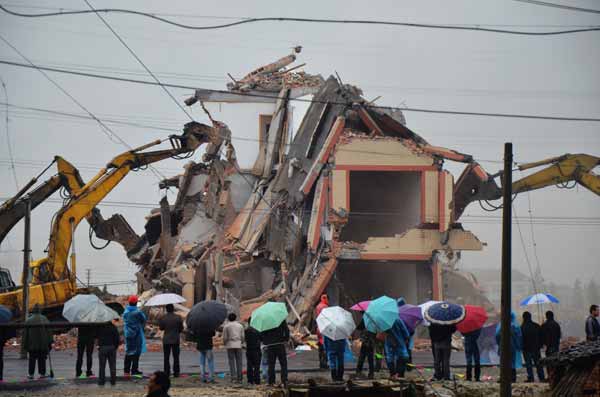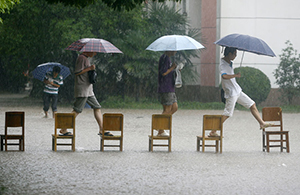Only full investigation can clear up circumstances of demolition death
(China Daily) Updated: 2016-07-15 07:38
 |
|
People watch a house being demolished in Wenling cityk, Zhejiang province, after its owner reached an agreement with the local government. [Photo provided to China Daily] |
Three weeks after her home was forcibly demolished in Yuelu district, Changsha, capital of Central China's Hunan province, the homeowner's body was found buried in the rubble. The absurd case is a test of Changsha government, which has vowed to fully implement rule of law in the city by 2020, says an article of the Southern Metropolis Daily on Thursday:
It is not big news in China that homeowners will risk their lives to try and stop their homes from being demolished. It is not unheard of for some of them to lose their lives in doing so.
However, the death of the woman in Changsha is uncommon. The Changsha government said in its latest investigation report the grassroots officials' "carelessness" caused the woman's death, without explaining whether the woman returned to her home after she had been evicted by officials in one last bid to stop the demolition of her home, which is what most people believe, or the officials failed to find her in the final evacuation of the building.
The city government has classified the case as a forcible demolition organized by the residential community office. But the tricky thing is forcible demolitions are illegal according to Chinese law.
As the officials engaged in an illegal action in the first place, the government's report should not explain the woman's death as being the result of officials' "carelessness" any more. There is no difference between carefulness or carelessness in a case in which they are suspected of breaking the law.
According to the report, Yuelu district Party chief, and other district officials will receive punishments and warnings. Seven lower-level village and residential community officials are being investigated by prosecutors.
But people have enough reasons to question whether the city government has the power to limit the case's judicial investigation and the following punishment meted out in light of criminal law to only grassroots officials.
It is known that the city government, instead of a residential community office, is the main beneficiary in selling land, and the lower-level officials are only executors of decisions made by their superiors.












